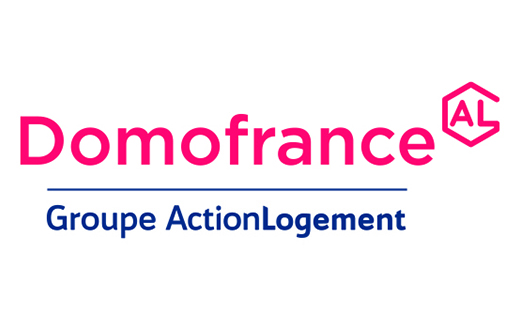

Domofrance

Nouvelle-Aquitaine, France
December 2020
Real estate - leased property
Service with Significant Environmental Footprint
France
Domofrance est une Entreprise Sociale pour l’Habitat, filiale du Groupe Action Logement Immobilier. Implantée à Bordeaux depuis sa création en 1958, elle gère près de 40 000 logements en Nouvelle-Aquitaine. Elle répond à un enjeu de société majeur en privilégiant la réussite du parcours résidentiel depuis les besoins spécifiques des étudiants et jeunes actifs jusqu’aux solutions pour ses locataires en perte d’autonomie. Domofrance est labellisée ISO 50001 pour sa gestion responsable de l’énergie et ISO 9001 pour le management de la qualité. Elle emploie près de 670 collaborateurs. Son chiffre d’affaires 2019 s’élève à 263 M€ (données post fusion au 1er septembre 2020). La mission de l'entreprise Domofrance est de rapprocher logement et emploi, proposer un habitat à usage mixte avec logements et commerces de proximité qui favorise le lien social, l’insertion économique (formation et accès à l'emploi), la mobilité douce, la sécurité des habitants, la vie des territoires. Domofrance is a Social Enterprise for Housing, a subsidiary of the Action Logement Immobilier Group. Established in Bordeaux since its creation in 1958. It responds to a major societal challenge by prioritizing the success of the residential course from the specific needs of students and young workers to solution
Overall B Impact Score
Governance 15.4
Governance evaluates a company's overall mission, engagement around its social/environmental impact, ethics, and transparency. This section also evaluates the ability of a company to protect their mission and formally consider stakeholders in decision making through their corporate structure (e.g. benefit corporation) or corporate governing documents.
What is this? A company with an Impact Business Model is intentionally designed to create a specific positive outcome for one of its stakeholders - such as workers, community, environment, or customers.
Workers 26.3
Workers evaluates a company’s contributions to its employees’ financial security, health & safety, wellness, career development, and engagement & satisfaction. In addition, this section recognizes business models designed to benefit workers, such as companies that are at least 40% owned by non-executive employees and those that have workforce development programs to support individuals with barriers to employment.
Community 17.3
Community evaluates a company’s engagement with and impact on the communities in which it operates, hires from, and sources from. Topics include diversity, equity & inclusion, economic impact, civic engagement, charitable giving, and supply chain management. In addition, this section recognizes business models that are designed to address specific community-oriented problems, such as poverty alleviation through fair trade sourcing or distribution via microenterprises, producer cooperative models, locally focused economic development, and formal charitable giving commitments.
Environment 40.7
Environment evaluates a company’s overall environmental management practices as well as its impact on the air, climate, water, land, and biodiversity. This includes the direct impact of a company’s operations and, when applicable its supply chain and distribution channels. This section also recognizes companies with environmentally innovative production processes and those that sell products or services that have a positive environmental impact. Some examples might include products and services that create renewable energy, reduce consumption or waste, conserve land or wildlife, provide less toxic alternatives to the market, or educate people about environmental problems.
What is this? A company with an Impact Business Model is intentionally designed to create a specific positive outcome for one of its stakeholders - such as workers, community, environment, or customers.
Customers 4.2
Customers evaluates a company’s stewardship of its customers through the quality of its products and services, ethical marketing, data privacy and security, and feedback channels. In addition, this section recognizes products or services that are designed to address a particular social problem for or through its customers, such as health or educational products, arts & media products, serving underserved customers/clients, and services that improve the social impact of other businesses or organizations.